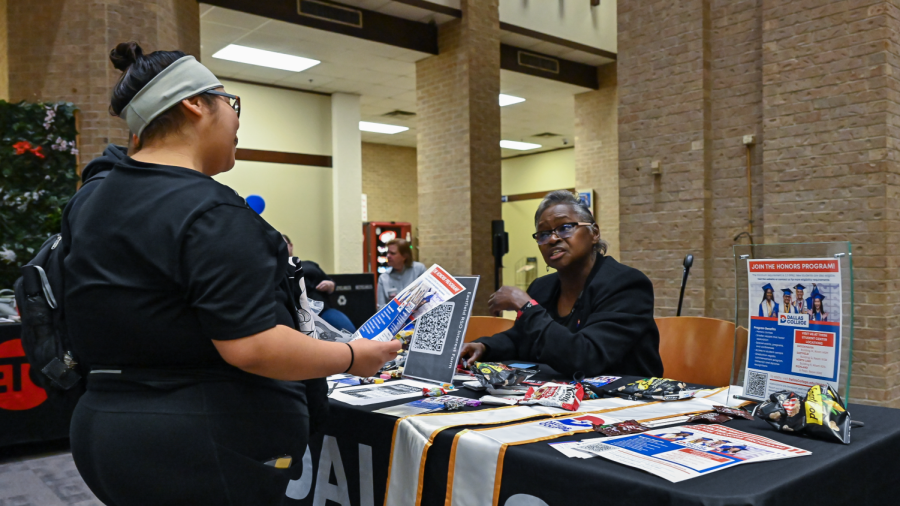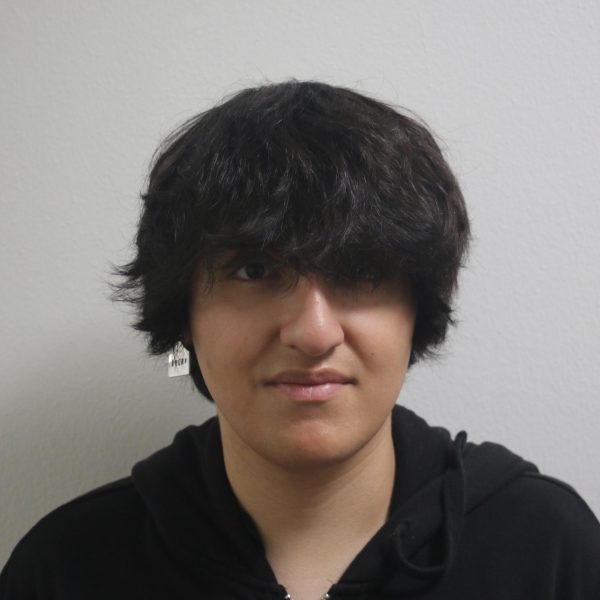Honors program aiming to expand outreach
Academic program coordinator Hedy Watkins talks to students about the honors program during the club fair on Feb. 8.
February 14, 2023
Dallas College’s honors program has created the Honors Student Organization to increase the program’s visibility.
The honors program has added new advisers to assist with the program. By building a community, the program aims to attract more students and offer even more honors courses, said Erika Machuca, honors program senior manager.
“Right now, we’ve been very digital, and that only gets you so far,” Machuca said. “We really need to get in front of students.”
Eastfield’s honors classes have been online since the consolidation due to a lack of enrollment in face-to-face classes, Machuca said.
“We need students to come in and bring us the opportunity to bring in-person honors classes back,” said Manuel Serrato, a political science major.
Serrato took the reins of the HSO’s leadership after Machuca asked for his help to attract more students into the honors program. Their goal is to have recruitment events and meetings before the semester ends.
“I’m in my last year. I want to do as much as possible,” Serrato said.
Serrato wants to achieve a boom in the honors program like those observed in other programs.
“Everyone knows what Student Life is because they are very, very visible. … Our scope is different,” Machuca said.
Serrato and academic program coordinator Hedy Watkins were in attendance for both the welcome bash on Jan. 26 and the club fair on Feb. 8. The latter event saw 15 students apply to the program. Students need a 3.3 GPA and nine credit hours to qualify for the honors program. Applications are accepted year-round at DallasCollege.edu/Honors.
Some students fear being saddled with more coursework, which may prevent them from joining the program, English instructor Elizabeth Huston said.
According to Dallas College’s website, honors classes are smaller in size, and coursework focuses on research and independent inquiries.
“We help them learn how to open themselves to thinking in different ways,” Huston said. “The main focus is helping them expand, not make it harder.”
Each campus used to have its own honors program and selection of honors classes. However, after the consolidation, all the programs were disbanded to make a general honors program for Dallas College – with no central location.
“Our offices are all over the place,” Serrato said.
Honors classes also have been scattered throughout campuses, requiring honors students to drive throughout Dallas to get to their classes.
Huston described having honors students who find their experience worsened by going digital. As the HSO’s co-adviser, Huston wants to bring honors students back into the classrooms.
Huston said some honors students have not enjoyed the online class environment due to the lack of discussion and focus compared to an in-person setting.
“There tends to be a camaraderie that develops with all our students, especially in a face-to-face environment,” Huston said.
The last time Huston taught an honors class was before the pandemic, and the class she’s currently teaching had to go online.
Her experience hasn’t been as fulfilling due to having limited interaction with her students.
Students like Serrato felt encouraged to take leadership roles in the HSO after interactions with student organizations that don’t struggle to recruit.
Serrato is already a member of Phi Theta Kappa and Eastfield’s League of United Latin American Citizens, doing what he can to help those programs gain members. But his ambitions have grown in the HSO, and one of his biggest goals is to help bring students into the organization and help it thrive in the future.
“I’m going to come back sometime, and I hope to see things are running smooth,” Serrato said.





